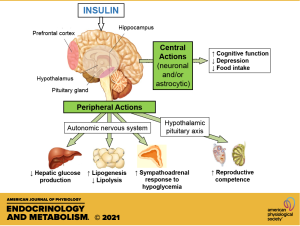When you hear insulin typically you think of blood sugar, the pancreas, or diabetes. Did you know it is in your brain as well? Well, if you didn’t no worries, until recently the brain was classified as an organ without it or just insensitive to insulin. Before we get into the logistics. Let’s review what insulin is exactly.
Insulin, when created in the pancreas is a hormone the allows glucose (aka sugar) to enter your blood stream. While in the brain it actually functions as a neuromodulator that helps neurons exist. According to a review, it is involved in neuronal survival, energy production, gene expression, and synaptic plasticity. As well as the breakdown of glucose as well. Metabolism or breakdown of glucose in the brain has been linked to have effect on how your neurons are able to learn and a persons’ memory.
A study has also showed that in mice neurons contain mRNA of preproinsulin. Which is insulin but in its’ “pre-hormone state”. It was found in all parts of the neuron including synapses. This leads to the synthesis of insulin. Insulin can also enter the brain from systems outside of the CNS. It enters through the BBB (blood brain barrier) by beta pancreatic cells.
So how does all this pertain to Alzheimer’s disease? (AD) Well, the by mistakes in the insulin pathways in the brain. Or a more common term, insulin resistance. Insulin receptors which control the breakdown of glucose in the brain. In turn can regulate of the overall health of neurons. Well, if the transmission of insulin gets wonky or in scientifical terms things like beta amyloid competition. Insulin cannot bind as well, which can lead to neuronal death. Therefore, insulin resistance can increase the pathology of AD.
Not only does insulin play a role in cognitive functions. Studies have also shown that it plays a role in anxiety and depression in the brain. Neuronal-specific insulin receptor knockout (NIRKO) has shown to increase anxiety and depression like symptoms in mice. Research has also shown that insulin can alter body weight and appetite. It can both increase and decrease appetite, which one? Well, it depends on how the insulin got to the brain. Shockingly it increases appetite when insulin enters the brain peripherally. Synthesized insulin or the insulin made in the brain is what can cause a decrease in appetite and lowers body weight. Below is a little figure that I find helpful to keep track of how insulin plays a role in all parts of our bodies. And how in each part in changes different things for us.

Being that research about insulin in the brain is all new, the possibilities of new findings can lead to remarkable actions we may be able to take to monitor our own health. Insulin in the brain has already been linked to having effects memory, neurological diseases, mental health, and our physical health like appetite and weight. Who knows maybe one day insulin will be something everyone will be familiar with, not just those who have to monitor blood sugar levels. It will be something everyone will want to monitor for themselves to live a long and better quality life.